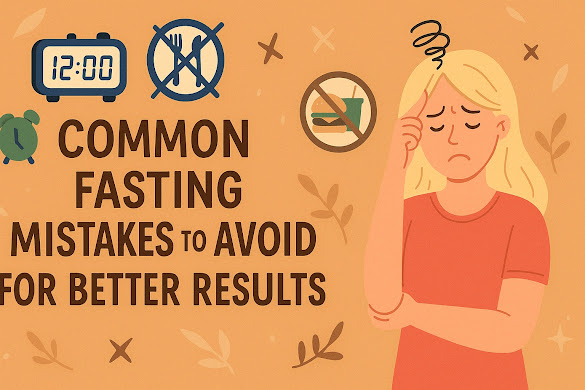6 Common Fasting Mistakes (and How to Fix Them)
Fix-it style guide to help beginners and intermediates fast smarter
Intermittent fasting can deliver incredible benefits — fat loss, better focus, improved insulin sensitivity, and more. But many people don’t see results because of a few easily avoidable mistakes.
In this post, we’ll walk through the top fasting pitfalls (backed by science) — and how to fix them so you get the results you’re working toward.
Mistake #1: Breaking Your Fast with the Wrong Foods
Why it matters:
Your first meal after a fast sets the tone for your blood sugar, cravings, digestion, and energy.
Common errors:
- High sugar foods (cereal, juice, pastries)
- Processed carbs
- Fried or greasy meals
Fix it:
Break your fast with protein + healthy fats + fiber.
Try this:
Collagen Protein Powder – Gut-Friendly Fast Breaker
Mistake #2: Not Eating Enough During Your Eating Window
Why it matters:
Under-eating can lead to nutrient deficiencies, hormone imbalances, and feeling weak, dizzy, or moody.
Fix it:
- Prioritize whole, nutrient-dense meals
- Include enough calories, especially if active
- Don’t fear healthy carbs (sweet potato, quinoa, etc.)
Mistake #3: Drinking the Wrong Things While Fasting
Why it matters:
Calories, sweeteners, and milk products during fasting hours can spike insulin and break your fast.
Avoid:
- Milk or cream in coffee
- Flavored drinks or “zero-calorie” sweeteners
- Sugary electrolytes or “detox” teas
Fix it:
Stick to clean hydration:
- Electrolyte Powder – Zero Sugar, Fasting Safe
- Organic Mold-Free Black Coffee – Supports Mental Clarity
Mistake #4: Over-Fasting (Too Much, Too Soon)
Why it matters:
Jumping into long fasts (20+ hours) without building metabolic flexibility can cause stress, fatigue, and hormone issues — especially for women.
Fix it:
- Start with 12–14 hour fasts
- Work up to 16:8 gradually
- Sync with your cycle if you’re female
Learn more: Is Intermittent Fasting Safe for Women?
Mistake #5: Fasting Without Electrolytes
Why it matters:
Fasting causes the body to flush sodium, potassium, and magnesium. Without these, you may feel tired, dizzy, or develop muscle cramps (aka “keto flu”).
Fix it:
- Add electrolytes to water daily
- Include a pinch of sea salt in water
- Use no-sugar electrolyte supplements
LMNT or Similar Electrolytes – No Sugar, Clean Formula
Mistake #6: Expecting Results Overnight
Why it matters:
Fasting isn’t magic — it’s a metabolic strategy that takes time to show results. Unrealistic expectations often lead to people quitting too early.
Fix it:
- Track non-scale victories (mood, energy, focus, digestion)
- Give it at least 3–4 weeks of consistency
- Pair with movement, good sleep, and quality food
Bonus Tip: Don’t Obsess Over the Clock
If you’re overly focused on hitting exact fasting hours to the minute, you may add stress — which raises cortisol and sabotages your results.
Listen to your body. Consistency is more important than perfection.
Final Thoughts
Fasting works — but only if done correctly. By avoiding these common mistakes, you’ll:
- Boost fat loss
- Protect muscle
- Support hormones
- Stay energized and consistent
Remember, fasting is a tool, not a punishment. Use it wisely, and your body (and mind) will thank you.
Share this post with someone who wants to try intermittent fasting.
And tag @TheResetRitual if you’re sharing your journey.
Disclaimer: This article is for informational purposes only and is not medical advice. Always consult with your healthcare provider before making changes to your diet, fasting routine, or lifestyle. This post may contain affiliate links. As an Amazon Associate, I earn from qualifying purchases.

